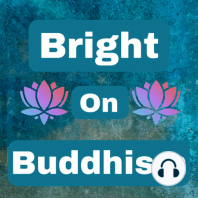23 min listen

What is the Buddhist philosophy of speech, language, and words?
What is the Buddhist philosophy of speech, language, and words?
ratings:
Length:
23 minutes
Released:
Jan 28, 2022
Format:
Podcast episode
Description
Bright on Buddhism Episode 18 - What is the Buddhist philosophy of speech, language, and words? What are some of the doctrines surrounding speech, language, and words? How do these doctrines play out in ritual and practice?
Resources: Kevin Trainor: Buddhism: An Illustrated Guide; Donald Lopez: Norton Anthology of World Religions: Buddhism; Chan Master Sheng Yen: Orthodox Chinese Buddhism; Nagarjuna: Verses of The Middle Way (The Madhyamakarika); Conze, Edward, trans. The Perfection of Wisdom in Eight Thousand Lines and Its Verse Summary. Bolinas, CA: Four Seasons Foundation, 1973.; The Bodhisattva Vow: A Practical Guide to Helping Others, page 1, Tharpa Publications (2nd. ed., 1995) ISBN 978-0-948006-50-0; Flanagan, Owen (2011-08-12). The Bodhisattva's Brain: Buddhism Naturalized. MIT Press. p. 107. ISBN 978-0-262-29723-3.; Williams, Paul, Mahayana Buddhism: The Doctrinal Foundations, Routledge, 2008, pp. 195–196.; Abé, Ryūichi. “Word” in Critical Terms for the Study of Buddhism, (Chicago: Chicago University of Press, 2005), pp.291-310. Flores, Ralph. “Fictions of Reading,” in Buddhist scriptures as Literature: Sacred Rhetoric and the Use of Theory (Albany, SUNY Press, 2008), pp. 1-16.; Flores, Ralph. “A Prince Transformed,” in Buddhist scriptures as Literature: Sacred Rhetoric and the Use of Theory (Albany, SUNY Press, 2008), pp. 17-33.; Barbara Ruch, “Coping with Death: Paradigms of Heaven and Hell and the Six Realms in Early Literature and Painting.” In Flowing Traces: Buddhism in the Literary and Visual Arts of Japan, ed. by James Sanford, William Lafleur and Masatoshi Nagatomi. Princeton: Princeton University Press, 1992. Charlotte. Eubanks. "The Ontology of Sutras." In Miracles of Book and Body: Buddhist Textual Culture and Medieval Japan, (Berkeley: University of California Press, 2011), pp. 19-61.; Introduction to Kūkai on the Philosophy of Language by Shingen Takagi and Thomas Eijo Dreitlein. Tokyo: Keio University Press, 2010.; Abé Ryūichi, “Semiology of the Dharma, or the Somaticity of the Text,” in Weaving of the Mantra: Kūkai and the Construction of Esoteric Buddhist Discourse. (New York: Columbia University Press, 2000) pp. 275-304.; Kasulis, Thomas P. “Truth Words: The Basis of Kūkai’s Theory of Interpretation,” in Buddhist Hermeneutics, ed. Donald Lopez, (Honolulu: University of Hawaii Press, 1988), pp. 257-272.
Do you have a question about Buddhism that you'd like us to discuss? Let us know by tweeting to us @BrightBuddhism, emailing us at Bright.On.Buddhism@gmail.com, or joining us on our discord server, Hidden Sangha https://discord.gg/tEwcVpu!
Credits:
Nick Bright: Script, Cover Art, Music, Voice of Hearer, Co-Host
Proven Paradox: Editing, mixing and mastering, social media, Voice of Hermit, Co-Host
---
Send in a voice message: https://podcasters.spotify.com/pod/show/brightonbuddhism/message
Resources: Kevin Trainor: Buddhism: An Illustrated Guide; Donald Lopez: Norton Anthology of World Religions: Buddhism; Chan Master Sheng Yen: Orthodox Chinese Buddhism; Nagarjuna: Verses of The Middle Way (The Madhyamakarika); Conze, Edward, trans. The Perfection of Wisdom in Eight Thousand Lines and Its Verse Summary. Bolinas, CA: Four Seasons Foundation, 1973.; The Bodhisattva Vow: A Practical Guide to Helping Others, page 1, Tharpa Publications (2nd. ed., 1995) ISBN 978-0-948006-50-0; Flanagan, Owen (2011-08-12). The Bodhisattva's Brain: Buddhism Naturalized. MIT Press. p. 107. ISBN 978-0-262-29723-3.; Williams, Paul, Mahayana Buddhism: The Doctrinal Foundations, Routledge, 2008, pp. 195–196.; Abé, Ryūichi. “Word” in Critical Terms for the Study of Buddhism, (Chicago: Chicago University of Press, 2005), pp.291-310. Flores, Ralph. “Fictions of Reading,” in Buddhist scriptures as Literature: Sacred Rhetoric and the Use of Theory (Albany, SUNY Press, 2008), pp. 1-16.; Flores, Ralph. “A Prince Transformed,” in Buddhist scriptures as Literature: Sacred Rhetoric and the Use of Theory (Albany, SUNY Press, 2008), pp. 17-33.; Barbara Ruch, “Coping with Death: Paradigms of Heaven and Hell and the Six Realms in Early Literature and Painting.” In Flowing Traces: Buddhism in the Literary and Visual Arts of Japan, ed. by James Sanford, William Lafleur and Masatoshi Nagatomi. Princeton: Princeton University Press, 1992. Charlotte. Eubanks. "The Ontology of Sutras." In Miracles of Book and Body: Buddhist Textual Culture and Medieval Japan, (Berkeley: University of California Press, 2011), pp. 19-61.; Introduction to Kūkai on the Philosophy of Language by Shingen Takagi and Thomas Eijo Dreitlein. Tokyo: Keio University Press, 2010.; Abé Ryūichi, “Semiology of the Dharma, or the Somaticity of the Text,” in Weaving of the Mantra: Kūkai and the Construction of Esoteric Buddhist Discourse. (New York: Columbia University Press, 2000) pp. 275-304.; Kasulis, Thomas P. “Truth Words: The Basis of Kūkai’s Theory of Interpretation,” in Buddhist Hermeneutics, ed. Donald Lopez, (Honolulu: University of Hawaii Press, 1988), pp. 257-272.
Do you have a question about Buddhism that you'd like us to discuss? Let us know by tweeting to us @BrightBuddhism, emailing us at Bright.On.Buddhism@gmail.com, or joining us on our discord server, Hidden Sangha https://discord.gg/tEwcVpu!
Credits:
Nick Bright: Script, Cover Art, Music, Voice of Hearer, Co-Host
Proven Paradox: Editing, mixing and mastering, social media, Voice of Hermit, Co-Host
---
Send in a voice message: https://podcasters.spotify.com/pod/show/brightonbuddhism/message
Released:
Jan 28, 2022
Format:
Podcast episode
Titles in the series (100)
What is the Buddhist philosophy of speech, language, and words? by Bright On Buddhism